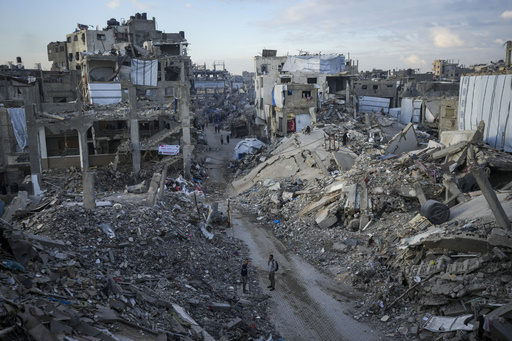
DEIR AL-BALAH, Gaza Strip — Saeed Abu Elaish has faced profound loss, with his wife and two daughters among the many family members who perished due to Israeli airstrikes in the past 15 months. The home he once knew in northern Gaza has been reduced to rubble, and he currently lives in a tent amidst the ruins. Despite these hardships, Abu Elaish asserts he will not abandon his homeland, particularly in light of remarks made by former President Donald Trump suggesting that Palestinians should be removed from Gaza to allow the U.S. to take control of the ravaged region. These comments have drawn harsh criticism from human rights organizations, which interpret them as calls for “ethnic cleansing” and forced removal.
“We firmly oppose any plans to deport or displace us from our land,” he declared from the Jabaliya refugee camp. Trump’s suggestion of relocating Gaza’s Palestinian population has shocked many within the territory. Following the ceasefire reached last month between Israel and Hamas, hundreds of thousands rushed back to their homes, even those that had been destroyed, as an expression of resilience and determination to reclaim their land. Many believe Trump’s comments serve a greater agenda aimed at expelling Palestinians entirely, echoing similar forced displacements that occurred during the 1948 war, an event known to Palestinians as the “Nakba,” or “Catastrophe.”
Abu Elaish, a health care professional, reflects on his family’s history of displacement. He recalls how in May 1948, Israeli forces drove his grandparents and others from their homes in Hoj, a village now situated within modern southern Israel, leading his family to resettle in Gaza’s Jabaliya camp, which has transformed into an urban area over the years. Many homes in Jabaliya have been reduced to rubble amid renewed hostilities with Hamas.
Mustafa al-Gazzar, now in his 80s, vividly remembers fleeing with his family from their hometown of Yabneh during the 1948 attacks. Sitting outside what remains of his home in Rafah, flattened by airstrikes, he conveyed his determination: “You think you’ll expel me abroad and bring others in my place? … I would rather live in my tent, under rubble. I won’t leave. Put that in your brain.” He emphasizes his longing to return to his birthplace, Yabneh, and advocates for a peaceful two-state solution that enables coexistence for both Israelis and Palestinians.
During a recent meeting with Israeli Prime Minister Benjamin Netanyahu, Trump suggested that Palestinians from Gaza could find resettlement in Egypt, Jordan, or other regions, while claiming that the U.S. would manage Gaza’s reconstruction, transforming it into a “Riviera of the Middle East.” However, both Egypt and Jordan have outright rejected such proposals. Following backlash, Trump’s administration attempted to clarify that the plan was intended for temporary relocation to facilitate rebuilding efforts.
Amna Omar, a resident from Deir al-Balah, criticized Trump as a “madman.” Having traveled to Egypt for her husband’s medical treatment, which ultimately ended in his passing, she expressed her resolve: “Gaza is our land, our home. We as Gazans have the right to this land and want to rebuild it. I don’t want to die in Egypt like my husband; I want to die at home.”
After enduring war and displacement, many Palestinians have clarified their desire to return to their homes. Joyous crowds have attempted to make their way back to northern Gaza and Rafah, areas heavily battered by Israeli military actions. Nonetheless, many returnees face homelessness and a lack of basic necessities, yet their determination to remain in their homeland is strong.
“We stay here, even if it means living amidst the debris of our homes — better than enduring humiliation elsewhere,” stated Ibrahim Abu Rizk, who returned to find his home destroyed. He lamented the brutality they endured for over a year and a half, questioning the idea of simply leaving.
A ceasefire agreement negotiated by the U.S., Egypt, and Qatar allows for the return of displaced Palestinians and also includes plans for a far-reaching international reconstruction initiative, provided an agreement is struck between Israel and Hamas regarding governance of the territory in question. International law forbids the forceful removal of populations, and Israeli rights group B’tselem condemned Trump’s rhetoric as a potential catalyst for another “Nakba,” forcibly uprooting approximately 2 million Palestinians.
Palestinian refugees have persistently sought the right to return to their ancestral homes within present-day Israel, a right recognized under international law; however, Israel denies that right, fearing it would disrupt the Jewish majority. Many Palestinians worry that Israel’s strategy may be to push them into Egypt. While the Israeli government has denied any such intent, certain right-wing officials have encouraged Palestinian emigration and the restoration of Jewish communities in Gaza.
The rejection of Trump’s proposal resonates not only in Gaza but also in the West Bank and among Palestinian communities in neighboring nations such as Jordan and Lebanon, who are already home to significant refugee populations. “If he wants to displace the population of Gaza,” stated Mohammed al-Amiri from Ramallah, “then he should return them to the homes from which they were forcibly removed in 1948.”

